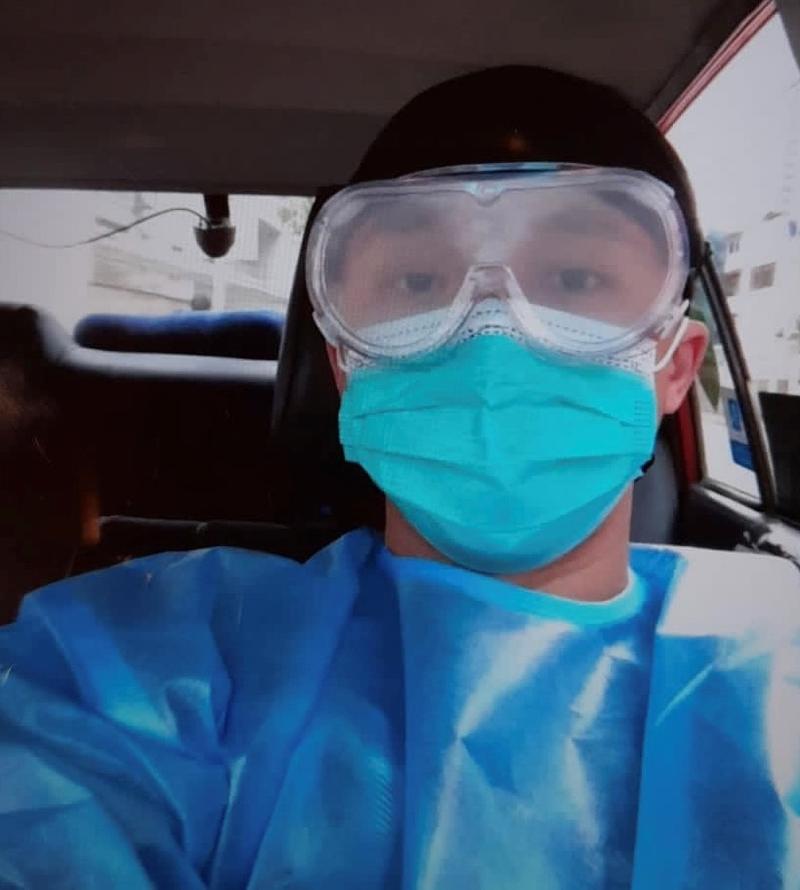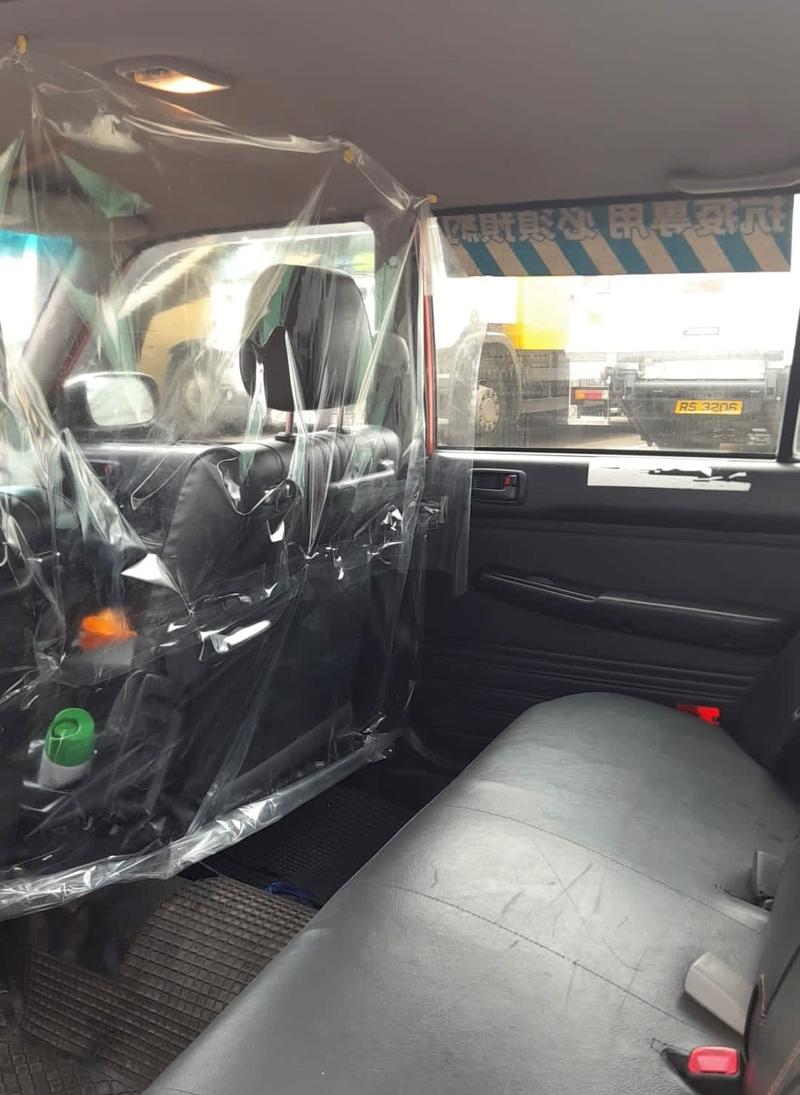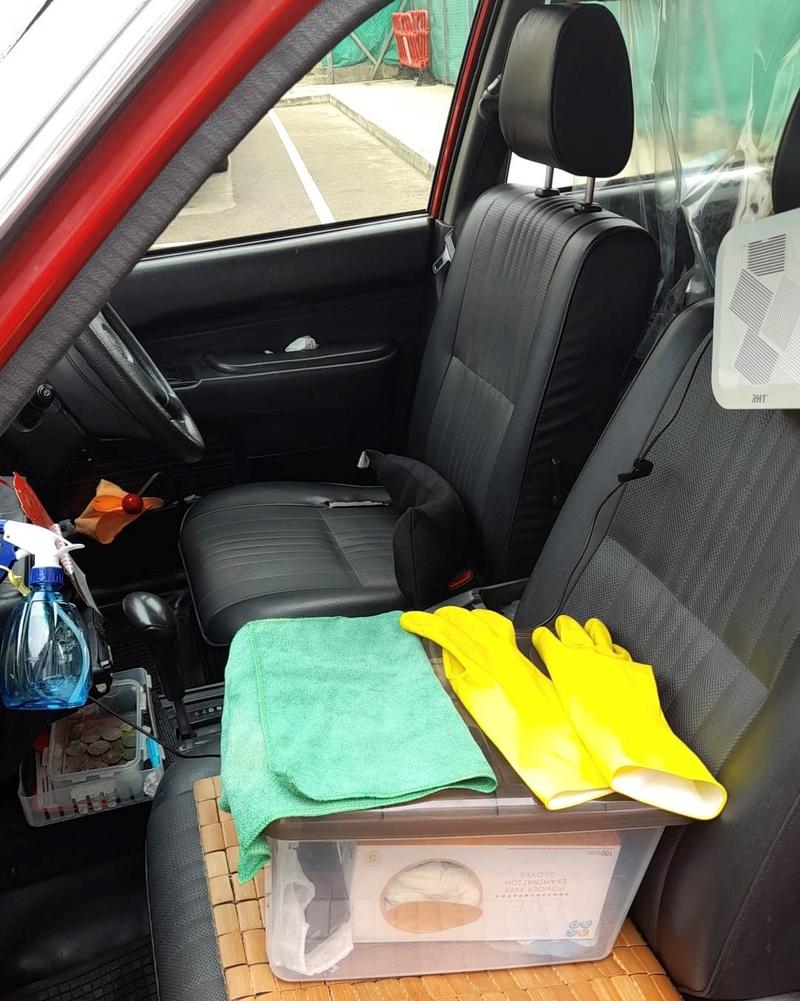 Taxi driver Jacky Liu Kai-wah takes a selfie in his car on March 22, 2022.
(PROVIDED TO CHINA DAILY)
Taxi driver Jacky Liu Kai-wah takes a selfie in his car on March 22, 2022.
(PROVIDED TO CHINA DAILY)
HONG KONG - It was seven o’clock in the morning. Taxi driver Jacky Liu Kai-wah closed the door of his home in Sham Shui Po, went downstairs and walked to his four-seater red Toyota Crown.
After disinfecting the inside and outside of the car, Liu sat in the driving seat wearing a protective gown and gloves. A few minutes later, the veteran driver started the engine, ready to begin his daily tasks – picking up COVID-19 patients around the city and driving them to the designated clinics.
READ MORE: Hong Kong taxi drivers join COVID-19 battle
In mid-February, the Hong Kong government listed seven designated clinics to treat COVID patients with mild symptoms, to ease the overwhelming pressure on public hospitals.
 The front and rear seats of Liu's car are separated by plastic sheeting. (PROVIDED TO CHINA DAILY)
The front and rear seats of Liu's car are separated by plastic sheeting. (PROVIDED TO CHINA DAILY)
In addition, the government established an anti-pandemic taxi fleet to provide free rides to patients traveling between clinics and their homes. The government pays HK$3,000 ($383) to each driver every day, which is twice their average daily income. Apart from COVID patients, they can’t pick up other passengers.
As the job involves close contact with COVID patients, Jacky Liu needs to wear protective equipment throughout his working day, and to disinfect the entire car after each trip. The front and rear seats of the car are also separated by a plastic sheeting
About 400 taxi drivers, including Liu, joined the special task force at the outset. Since mid-Feb, Liu has worked almost every day, ferrying patients. Working from 7 am to 6 pm, he picks up an average of seven to eight batches of patients every day. He receives orders through an online system, which shows passengers’ locations and destinations. Like every anti-pandemic taxi, his car has a blue and white sticker on the window, reading “only for COVID patients with reservation”, to distinguish it from other taxis.
As the job involves close contact with COVID patients, Liu needs to wear protective equipment throughout his working day, and to disinfect the entire car after each trip. The front and rear seats of the car are also separated by a plastic sheeting.
Liu said he was worried about becoming infected at the very beginning. His fears were eased later, partly due to the kindness shown by others.
ALSO READ: COVID-19 taxis start rolling
Most patients, whether young or old, express their thanks to him when they get out of the car. Having been a taxi driver for more than ten years, Liu said such scenes are rarely seen in normal times.
An old lady wanted to give him HK$80 to cover the taxi fare. He refused the money and explained that the fares are subsidized by the government.
 Liu keeps his taxi compartment clean by frequently disinfecting it. (PROVIDED TO CHINA DAILY)
Liu keeps his taxi compartment clean by frequently disinfecting it. (PROVIDED TO CHINA DAILY)
Strangers have also been showing him their support. Once he parked his car in Happy Valley for disinfection; an elderly person recognized that Liu’s car is designated for ferrying COVID-patients and gave him the thumbs-up. “Thank you for serving the city,” the elderly person said.
There have also been some unpleasant moments. When he has parked or cleaned his car at the roadside, some passers-by have avoided him, as if he was infected with the virus.
Apart from the strange looks he sometimes gets from pedestrians, some people have also smeared the drivers on social media platforms, claiming they do not strictly follow anti-pandemic guidelines during their work.
Some senior drivers have quit the fleet due to such pressures. Liu also makes sure he always keeps a strict distance from the general public and eats his meals in the parking lot.
Liu’s work has become busier since the government increased the number of designated clinics to 23 in mid-March. The increasing workload also brings with it a higher risk of infection.
So far more than 30 drivers in the 400-member fleet have become infected. Liu said he will continue to do the work as long as he is not struck down.
After the pandemic, Liu said the first thing he will do is take his four-year-old daughter out to enjoy the fresh air without the need for a mask.


